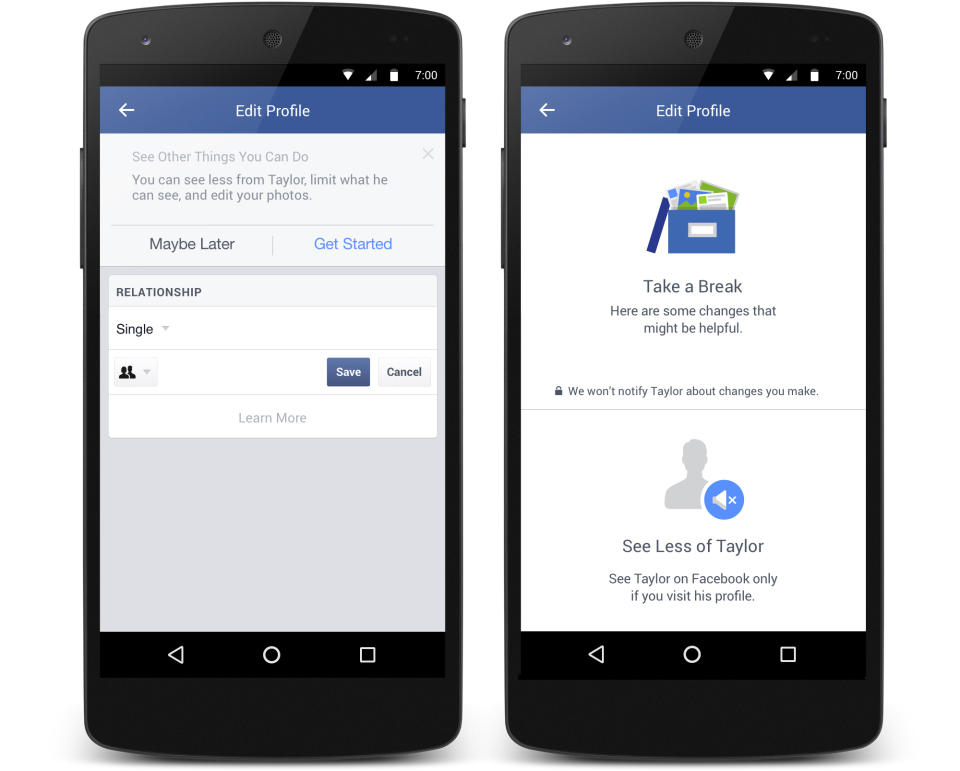BFF Facebook Wants to Help You Get Over That Breakup
When your Facebook relationship status goes from “in a relationship” to “single,” it can suck to continue seeing posts from your ex, especially ones that include photos of them looking remotely happy with someone new. So like a friend who comes over with a pint of ice cream, the social network will now offer to help you through the aftermath.

In a blog post on Thursday, Facebook said it’s starting to test out options that will pop up when you change your relationship status on the site, making it simpler for you to decide just how much of your ex you want to see on Facebook, and vice versa. For instance, you can change settings so you’ll stop seeing them in your News Feed, and they won’t be a suggested person to tag in photos. You can also make it so your ex will only see certain posts of yours – those you share publicly, post on mutual friends’ timelines, or tag your ex in.
Facebook is trying out these new tools in the US first on its smartphone app, and says it will adjust things based on how users respond. (One option they seem to have left off the list, which I’d like to humbly suggest: letting you adjust your account settings so that your ex can only see photos of you looking happy with a new person.)
Facebook says it hopes these tools will “help people end relationships on Facebook with greater ease, comfort and sense of control.” How nice. In the midst of a breakup, that could be pretty handy.
But it’s a little strange, too, to think of Facebook as having feelings for me and trying to stir up feelings in me, a user. This is something I’ve been noticing increasingly as the social network reaches out in my News Feed, frequently offering me memories from my past (until I told it to cut it out) and trying to stir up emotions with things like the “A Look Back” videos it created last year that automatically sum up your life on the site (see “Facebook’s Clever Birthday Present for Its Users”). Part of me is genuinely moved by Facebook’s overtures; part of me is creeped out since it is, after all, a technology company, not a close friend.
And, not to be too much of a cynic, but there’s got to be something in this for the social network too, right?
Most definitely. The easier it is to get your no-longer-significant other out of your Facebook feed without actually defriending them (so you can still occasionally sneak a peek at what they’re up to, not that you ever would), the more likely you are to keep hanging out on Facebook. Which might help you connect with friends who can help you feel better about your breakup. Which is nice for you, but also great for Facebook, because that means you’ll be able to see–and perhaps click on–that many more ads.
Keep Reading
Most Popular
Large language models can do jaw-dropping things. But nobody knows exactly why.
And that's a problem. Figuring it out is one of the biggest scientific puzzles of our time and a crucial step towards controlling more powerful future models.
How scientists traced a mysterious covid case back to six toilets
When wastewater surveillance turns into a hunt for a single infected individual, the ethics get tricky.
The problem with plug-in hybrids? Their drivers.
Plug-in hybrids are often sold as a transition to EVs, but new data from Europe shows we’re still underestimating the emissions they produce.
Google DeepMind’s new generative model makes Super Mario–like games from scratch
Genie learns how to control games by watching hours and hours of video. It could help train next-gen robots too.
Stay connected
Get the latest updates from
MIT Technology Review
Discover special offers, top stories, upcoming events, and more.